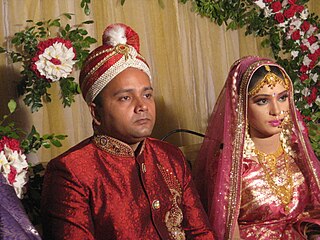
Kanuri is a Saharan dialect continuum of the Nilo–Saharan language family spoken by the Kanuri and Kanembu peoples in Nigeria, Niger, Chad and Cameroon, as well as by a diaspora community residing in Sudan.

The Kanuri people are an African ethnic group living largely in the lands of the former Kanem and Bornu Empires in Niger, Nigeria, Chad, and Cameroon, as well as a diaspora community residing in Sudan. Those generally termed Kanuri include several subgroups and dialect groups, some of whom identify as distinct from the Kanuri. Most trace their origins to ruling lineages of the medieval Kanem–Bornu Empire, and its client states or provinces. In contrast to the neighboring Toubou or Zaghawa pastoralists, Kanuri groups have traditionally been sedentary, engaging in farming, fishing the Chad Basin, trade, and salt processing.

The Ijaw people, also known as the Ịjọ people, are an ethnic group found in the Niger Delta region in Nigeria, with primary population clusters in Bayelsa, Delta, and Rivers. They also have significant population clusters in Edo, Lagos, Ondo. and small parts of Akwa Ibom.
The Fur are an ethnic group predominantly inhabiting Darfur, the western part of Sudan, where they are the largest ethnic group. They speak the Fur language, which belongs to the Nilo-Saharan family.

A groomsman or usher is one of the male attendants to the groom in a wedding ceremony. Usually, the groom selects close friends and relatives to serve as groomsmen, and it is considered an honor to be selected. From his groomsmen, the groom usually chooses one to serve as best man.
The Adamawa languages are a putative family of 80–90 languages scattered across the Adamawa Plateau in Central Africa, in northern Cameroon, north-western Central African Republic, southern Chad, and eastern Nigeria, spoken altogether by only one and a half million people. Joseph Greenberg classified them as one branch of the Adamawa–Ubangi family of Niger–Congo languages. They are among the least studied languages in Africa, and include many endangered languages; by far the largest is Mumuye, with 400,000 speakers. A couple of unclassified languages—notably Laal and Jalaa—are found along the fringes of the Adamawa area.

Bride kidnapping, also known as marriage by abduction or marriage by capture, is a practice in which a man abducts the woman he wishes to marry.

Ala kachuu is a form of bride kidnapping practiced in Kyrgyzstan. The term can apply to a variety of actions, ranging from a consensual elopement to a non-consensual kidnapping, and to what extent it actually happens is controversial. Some sources suggest that as of 2005 at least a third of Kyrgyzstan's brides had been taken against their will.
The money dance, dollar dance, or apron dance is an event at some wedding receptions in various cultures. During a money dance, male guests pay to dance briefly with the bride, and sometimes female guests pay to dance with the groom.

The Musgum or Mulwi are a Chadic ethnic group in Cameroon and Chad. They speak Musgu, a Chadic language, which had 61,500 speakers in Cameroon in 1982 and 24,408 speakers in Chad in 1993. The Musgum call themselves Mulwi.

Islamic marital practices are traditions and practices that relate to wedding ceremonies and marriage rituals in the Muslim world. Although Islamic marriage customs and relations vary depending on country of origin and government regulations, Muslims from around the world are guided by Islamic laws and practices specified in the Quran. Islamic marital jurisprudence allows Muslim men to be married to multiple women.
The Urhobos are people located in southern Nigeria, near the northwestern Niger Delta. They are the major ethnic groups in Delta State. The people in this ethnic group speak the Urhobo language. Their population is approximately 7 million.
Ukuthwala is the South African term for bride kidnapping, the practice of a man abducting a young girl and forcing her into marriage, often without the consent of her parents. These "marriages by capture" occur mainly in rural parts of South Africa, in particular the Eastern Cape and KwaZulu-Natal. The Basotho call it tjhobediso. Among the Xhosa and Zulu people, ukuthwala was once an acceptable way for two young people in love to get married when their families opposed the match. Ukuthwala has been abused, however, "to victimize isolated rural women and enrich male relatives."

The Bafumbira, are a Bantu ethnic group from Kisoro District in South Western Uganda. They are of three indigenous groups: Bahutu, Batutsi and Batwa.
Wedding customs in Ethiopia vary among the tribes of the country.
The Kibaku people are an ethnic group inhabiting the Chibok Local Government Area, in eastern Borno State in Nigeria.
{{Infobox ethnic group | group = Bura and Pabir People | native_name = Bura and Pabir People | region = [[Borno State], [Adamawa State], [YobeState]] | religions = Christianity, Islam, Traditional |Developments. = The birth of Bura-Pabir poetry and literature, New words generation, by poet Ahmed balami | related_groups = Hausa, Fulani, Kanuri, Chibok, Marghi }}
Yandang people are one of the tribes in Nigeria. They are located in Mayo-belwa in Adamawa state and Lau, Ardo Kola, Gasol in Taraba state.

About a quarter of Nigeria's population are Hausa. They are predominantly Muslim, but some are Christians. They speak the Hausa language, although different tribes speak different dialects. Hausa traditional marriage is not as expensive as other forms of marriage in Nigeria. Hausa traditional marriage is based on Islamic or Sharia law.










